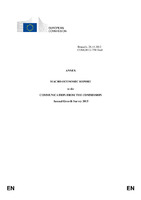| dc.description.abstract | The EU economy continues to struggle with the post-financial crisis correction. Financial tensions have continued in the euro area before the summer, while the global economy has decelerated reducing the potential contribution of exports to recovery. Therefore, the short-term outlook for the EU economy remains weak, but a gradual return to growth is projected for 2013 and a further strengthening in 2014. This outlook creates additional challenges for the necessary adjustment in many EU Member States. In particular, low growth prospects hold back investment, job creation and accelerate labour shedding, as the margins to use flexibility in work patterns are now reduced. The challenges facing the EU economy continue to be daunting. In particular, several Member States' economies continue to face large deleveraging of the private and public sectors. This deleveraging reflects the unwinding of accumulated financial imbalances linked to previous unsustainable expenditure levels financed by credit, in some cases promoted by asset price bubbles in the private sector and in others by the lack of fiscal rigour in the public sector. This is now weighing on growth, as spending is reduced and income directed to debt repayment. |

